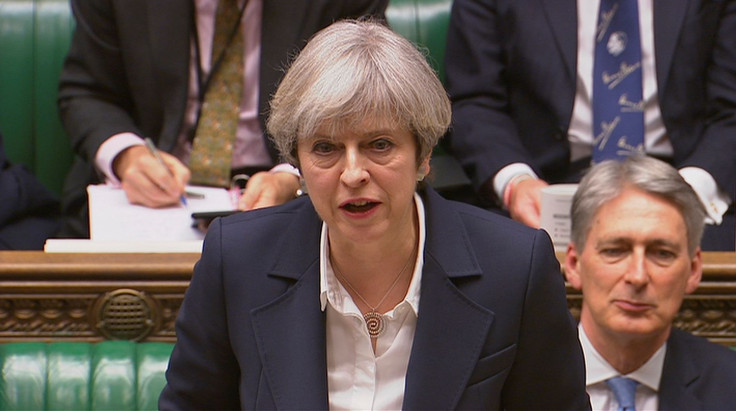What Is Article 50? Brexit Will Include 'The Right Deal For Every Person,' Theresa May Promises

The U.K.’s ambassador to the European Union handed over a six-page letter from British Prime Minister Theresa May to EU leader Donald Tusk on Wednesday, initiating the process of detaching the country from the bloc—a move more commonly known as “Brexit.”
The Article 50 letter. #Brexit pic.twitter.com/SO5R5BTvhw
— Charles Michel (@eucopresident) March 29, 2017
To do that, May must invoke Article 50 of the Treaty of Lisbon, which tied together previous agreements to form the current iteration of the EU. It was signed in December 2007 and went into force about two years later.
Read: Brexit Triggered By Theresa May's Letter To European Union
Article 50 of that treaty allows any member state to “decide to withdraw from the Union in accordance with its own constitutional requirements” as long as that nation gives the EU some advance notice. However, the decision to break away from the bloc isn’t a done deal as soon as the member state decides to leave.
“In the light of the guidelines provided by the European Council, the Union shall negotiate and conclude an agreement with that State, setting out the arrangements for its withdrawal, taking account of the framework for its future relationship with the Union,” the treaty states, adding that the deal must be reached in accordance with another item of the agreement, Article 218(3), which outlines the negotiation process. “It shall be concluded on behalf of the Union by the Council, acting by a qualified majority, after obtaining the consent of the European Parliament.”
Once the negotiations come to a close, the treaties defining the rules—and benefits, such as subsidies and little to no trade barriers—of EU membership would no longer apply.
May promised Wednesday to score “the right deal for every person in this country,” but exporters alone in the U.K. would lose an estimated $7.6 billion, produce prices in the country would likely rise 8 percent, the bill charged by EU negotiators could be up to nearly $75 billion and the U.K.’s gross domestic product could fall by as much as 9.5 percent compared to a future remaining in the EU.
Read: Will Scotland Leave The UK? Sturgeon Confirms 2nd Independence Referendum After Brexit Fallout
The prime minister, however, could be in a bind if negotiations hit a dead end. Article 50 also states that, in the event that the exiting state and the bloc’s negotiators fail to reach a deal, the detachment would take place “two years after the notification… unless the European Council, in agreement with the Member State concerned, unanimously decides to extend this period.”
Tusk—who presides over the European Council, a group consisting of the heads of state of every country in the EU—set the date for the political body’s negotiations with the U.K. as April 29, according to a statement from the council in response to May’s letter.
© Copyright IBTimes 2025. All rights reserved.






















